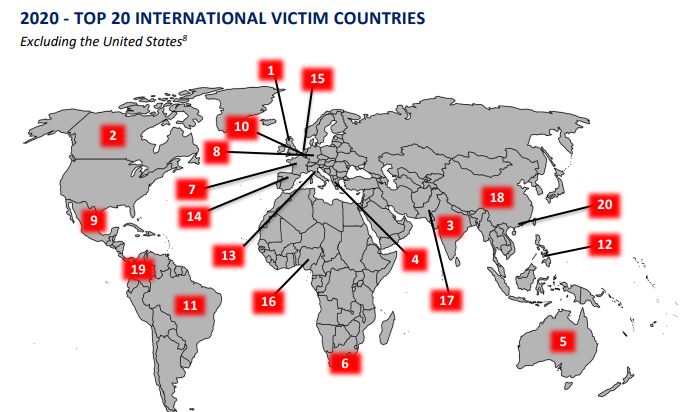How Nigeria, US, 19 Others Lost Over $4.1b To Cyber Fraud In 2020 - FBI Makes Fresh Revelation
Posted by Samuel on Thu 18th Mar, 2021 - tori.ng
It has been revealed, in a new report by FBI that Nigerians, Americans, Britons, and citizens of 18 other countries lost over $4.1 billion to cyber scam, identity theft, Internet romance scam, business email compromise, and other fraudulent activities in 2020.
The Internet Crime Complaint Centre of the Federal Bureau of Investigation said the fraudsters also targeted the Coronavirus Aid Relief, and Economic Security Act, which included provisions to help small American businesses during the pandemic.
The centre said it received over 791,790 complaints with reported losses exceeding $4.1bn representing 69 per cent increase in total complaints from 2019.
This was contained in the 2020 Internet Crime Report released by the FBI on Wednesday.
Apart from US, the FBI said it also received complaints from victims in 20 countries, including 443 persons in Nigeria; 216, 633 in United Kingdom; Canada, 5,399; India 2,930; Greece 2,314; Australia 1,807; 5. Australia 1,807; South Africa 1,754; France 1,640; Germany 1,578; Mexico 1,164, Belgium 1,023 and nine other countries.
The IC3 report in its breakdown of losses said $1,866,642,107 was lost to BEC/EAC; overpayment $51,039,922; Confidence fraud/romance $600,249,82; Ransomware $29,157,405; Investment $336,469,000; Healthcare-related $29,042,515; Non-payment/Non-delivery $265,011,249 and Civil matter $24,915,958.
Others are Identity theft $219,484,699; Misrepresentation $19,707,242; Spoofing $216,513,728; Malware/scareware/virus $6,904,054; Real estate/Rental $213,196,082; Harassment/threats violence $6,547,449; Personal data breach $194,473,055;Copyright/Counterfeit $5,910,617; Tech support $146,477,709; Charity $4,428,766; Credit card fraud $129,820,792;Gambling $3,961,508; Corporate data breach $128,916,648; Re-shipping $3,095,265; Government Impersonation $109,938,030 and Crimes Against Children $660,044.
Victims also lost $512,127 to denial of service; Advanced Fee $83,215,405; Hacktivist $50; Extortion $70,935,939; Employment $62,314,015; Lottery/sweepstakes/Inheritance $61,111,319 Phishing/vishing/smishing/pharming $54,241,075 and Descriptors Social Media $155,323,073.
The report said, “In 2020, the IC3 received thousands of complaints reporting emerging financial crime revolving around CARES Act stimulus funds, specifically targeting unemployment insurance, Paycheck Protection Program loans, and Small Business Economic Injury Disaster Loans, as well as other COVID-related fraud.
“Most of the IC3 complaints related to CARES Act fraud involved grant fraud, loan fraud, and phishing for Personally Identifiable Information. Complaints have been filed from citizens in several states describing fraudulently submitted online unemployment insurance claims using their identities. Many victims of this identity theft scheme did not know they had been targeted until they attempted to file their own legitimate claim for unemployment insurance benefits.”
The FBI further said the IC3 received 19,369 Business Email Compromise / Email Account Compromise complaints with adjusted losses of over $1.8bn, noting that the centre observed an increase in the number of BEC/EAC complaints related to the use of identity theft and funds being converted to cryptocurrency accounts.
The report noted, “Over the years, the scam evolved to include compromise of personal emails, compromise of vendor emails, spoofed lawyer email accounts, requests for W-2 information, the targeting of the real estate sector, and fraudulent requests for large amounts of gift cards.
“In 2020, the IC3 In these variations, we saw an initial victim being scammed in non-BEC/EAC situations to include extortion, tech support, romance scams, etc., that involved a victim providing a form of ID to a bad actor. That identifying information was then used to establish a bank account to receive stolen BEC/EAC funds and then transferred to cryptocurrency accounts.”




















































